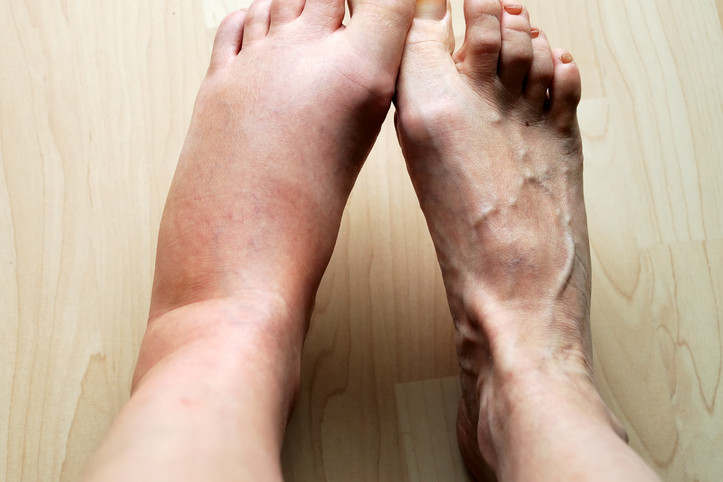
5 timeless habits for better health

What are the symptoms of prostate cancer?

Is your breakfast cereal healthy?

When pain signals an emergency: Symptoms you should never ignore

Does exercise give you energy?

Acupuncture for pain relief: How it works and what to expect

How to avoid jet lag: Tips for staying alert when you travel

Biofeedback therapy: How it works and how it can help relieve pain

Best vitamins and minerals for energy

Should you take probiotics with antibiotics?
Heart Failure Archive
Articles
New hope for an unusual form of heart failure
Until recently, cardiac amyloidosis was considered rare and untreatable.
As America's population ages, heart failure diagnoses are on the rise — especially the type caused by a stiff, thickened heart muscle. The heart pumps adequately but can't relax, causing fluid to back up into the lungs, leading to symptoms such as breathlessness and fatigue.
Doctors refer to this form of heart failure as "heart failure with preserved ejection fraction," or HFpEF. About half of all heart failure diagnoses fall into this category, yet the condition has proved challenging to treat. But cardiologists are now recognizing that about 10% to 15% of people with stiff, failing hearts may have cardiac amyloidosis.
Concerns about swollen legs
Ask the doctor
Q. I have noticed my legs are getting more swollen lately. Is this anything to worry about? My mother also had this problem and was diagnosed with heart failure.
A. Leg swelling is very common, especially as people get older. Heart failure, which means the heart can't function well enough to meet the body's needs, is certainly on the list of serious causes. However, people usually experience other symptoms such as shortness of breath and fatigue by the time the heart failure becomes serious enough to cause leg swelling.
Fluid retention: What it can mean for your heart
Fluid buildup indicates worsening heart failure. Learn how to spot it and treat it early.
The buildup of excess fluid in your body can take a variety of forms from belly bloating and swollen ankles to nausea, persistent coughing and fatigue. You may be tempted initially to dismiss this hodgepodge of problems as having little to do with your heart. However, they all signal water retention, which can mean trouble for people with a history of heart failure.
Women less likely than men to receive potentially lifesaving heart device
Research we're watching
Women experiencing heart failure are less likely than men with the same condition to receive a mechanical heart pump designed to help blood circulate through the body, says a study published in the September issue of the journal Circulation: Heart Failure. The pump, called a left ventricular assist device, or LVAD, is typically used in people who have advanced heart failure. Looking at data from nearly 30,000 hospitalizations in which people received an LVAD device, the researchers found that women made up only 21.9% of those recipients. That number represented a decline from 2004, when 25.8% of LVAD recipients were women. The study's author said the difference might reflect a reliance on outdated statistics that showed women were more likely to die after receiving LVAD devices. This is no longer the case with new versions of the device.
Image: JFsPic/Getty Images
Stay on top of heart failure symptoms
Heart failure — this dire-sounding term often brings to mind a heart that has beat its last. Not so. Heart failure means that the heart isn't able to pump enough blood to meet the body's needs. Common effects of heart failure include fatigue, shortness of breath, and swelling in the legs.
Many people are surprised to learn that heart failure is often a manageable condition. Taking medications, balancing exercise and rest, following a low-sodium diet, and being careful about fluid intake can help keep it in check. But heart failure can be unpredictable. After a long stretch of being under control, it can flare up, and even require a hospital stay.
Red meat, TMAO, and your heart
A substance called trimethylamine N-oxide, which is produced when your body digests red meat, may raise the risk of cardiovascular problems.
Experts used to think that red meat raised your risk of heart disease simply because it was high in saturated fat. But today that picture has gotten more complicated thanks to the discovery of a metabolite — a substance produced during digestion and metabolism — called trimethylamine N-oxide, or TMAO.
According to a news article published June 11 in JAMA, three recent analyses have linked high blood levels of TMAO with a higher risk for both cardiovascular disease and early death from any cause. In one of those studies, researchers found that people with higher levels of TMAO in their blood may have more than twice the risk of heart attack, stroke, or other serious cardiovascular problems, compared with people who have lower levels. Other studies have found links between high TMAO levels and heart failure and chronic kidney disease.
What is a bubble study?
Ask the doctor
Q. My cardiologist mentioned that he was going to do a "bubble study" during my echocardiogram. What is that?
A. During an echocardiogram, a technician uses a probe that emits high-frequency sound waves (ultrasound) that "echo" off the structures of your heart. The waves, which are translated into video images visible on a monitor, can reveal in-formation about your heart's structure and function. A bubble study gives added information, as it can identify potential blood flow issues inside your heart.
A diet that may stave off heart failure
Research we're watching
A plant-focused diet long touted for its ability to lower blood pressure may also help prevent heart failure, according to a new study.
The DASH diet, which stands for Dietary Approaches to Stop Hypertension, emphasizes fruits, vegetables, whole grains, low-fat dairy products, poultry, fish, and nuts while minimizing salt, sugar, and red meat consumption.
Regular exercise helps reverse age-related changes in your heart
Moderate workouts on most days of the week may be enough for heart-healing benefits.
Image: © kali9/Getty Images
Good news: If you've spent most of your life as a competitive master athlete who trains more than six days a week (in addition to competitions) your heart probably looks and performs like one that is much younger than its chronological age.
Doesn't sound like you? Don't worry, there's also some good news for the rest of us. Even if you've spent more time hanging out than working out over the past few decades, starting an exercise program in middle age might earn you a younger-looking heart too.
Certain pain relievers could harm your heart
But use is primarily a concern for people who take them over a long period or who have certain health risks.
Image: © clu/Getty Images
Numerous studies in recent years have raised concerns that common pain relievers known as nonsteroidal anti-inflammatory drugs (NSAIDs) increase the risk of cardiovascular problems, such as heart attack and stroke.
A study published September 4 in The BMJ seems to confirm the risks associated with NSAIDs and notes that one medication in particular — diclofenac (Voltaren) — is associated with even higher risks to cardiovascular health than others in the same category.

5 timeless habits for better health

What are the symptoms of prostate cancer?

Is your breakfast cereal healthy?

When pain signals an emergency: Symptoms you should never ignore

Does exercise give you energy?

Acupuncture for pain relief: How it works and what to expect

How to avoid jet lag: Tips for staying alert when you travel

Biofeedback therapy: How it works and how it can help relieve pain

Best vitamins and minerals for energy

Should you take probiotics with antibiotics?
Free Healthbeat Signup
Get the latest in health news delivered to your inbox!
Sign Up











